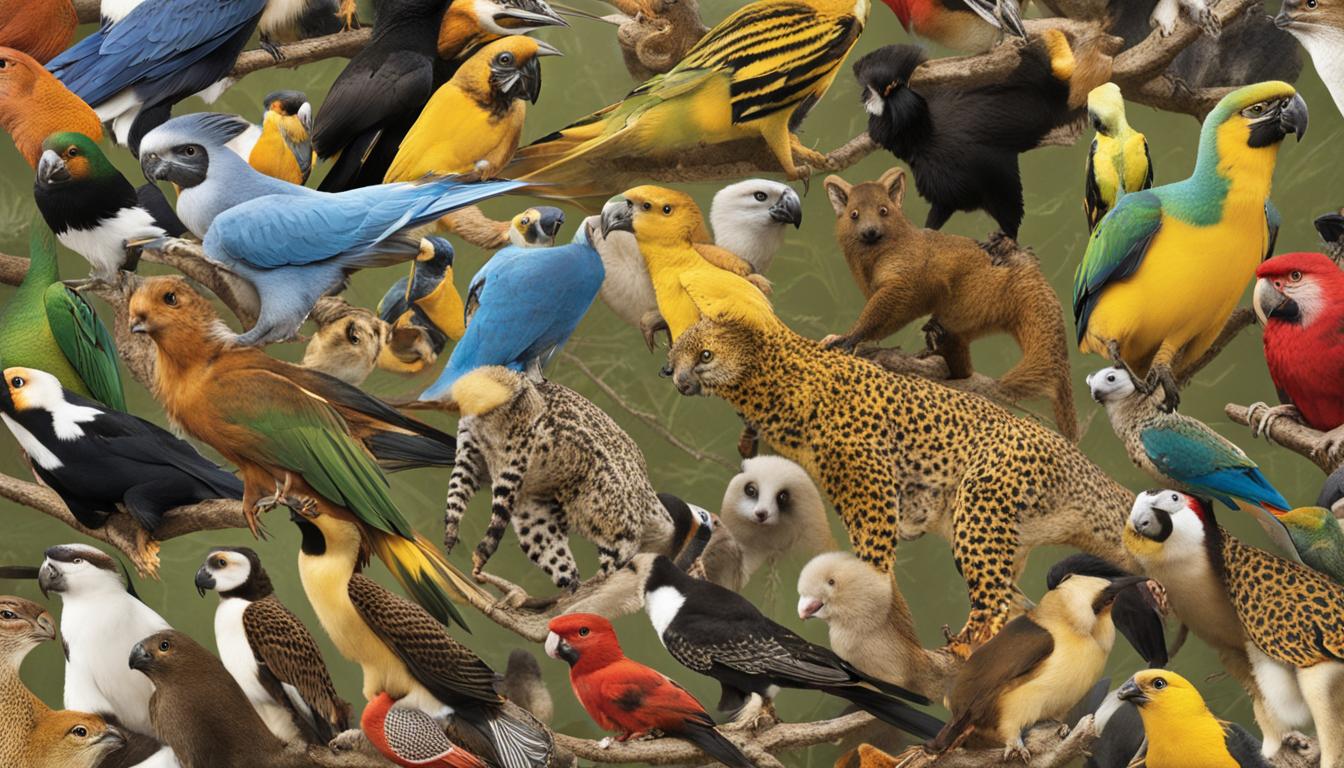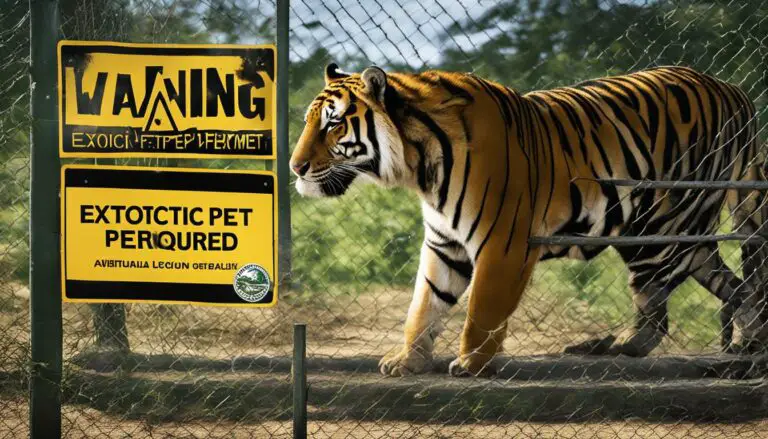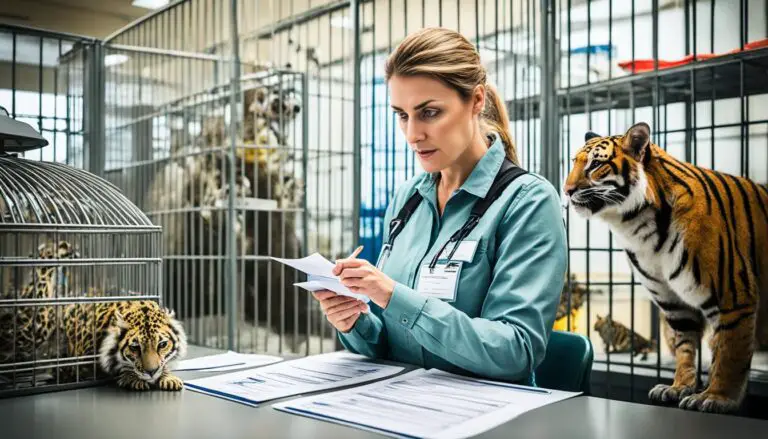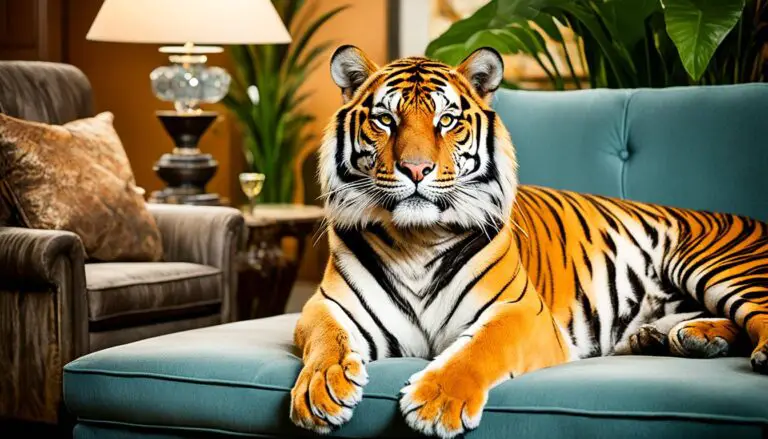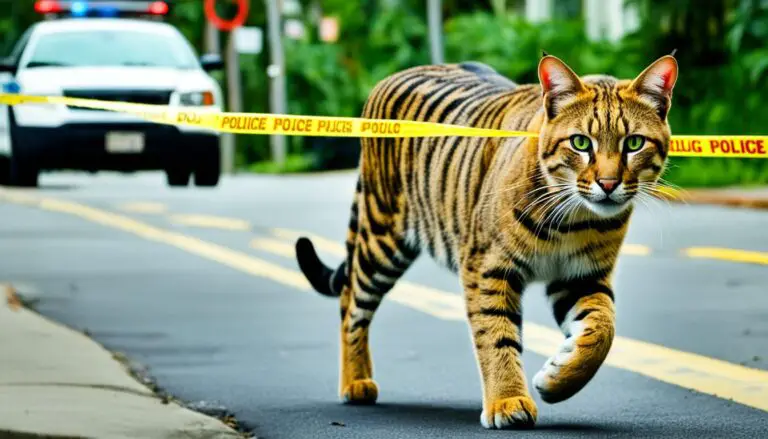Exotic Pet Laws by State: Know Your Rights
The laws regarding the private ownership of exotic pets vary by state in the United States. Knowing the legal requirements and restrictions for owning exotic animals is essential for potential owners. The following sections will provide a comprehensive overview of the exotic pet laws in each state.
Key Takeaways:
- Exotic pet laws differ from state to state in the United States.
- It is important to understand the legal requirements before owning an exotic pet.
- Some states have comprehensive bans on exotic pet ownership.
- Other states have partial bans or licensure schemes.
- Research and understand the specific laws in your state before acquiring an exotic pet.
States with Comprehensive Bans on Exotic Pet Ownership
As individuals consider the option of owning an exotic pet, it is crucial to understand the laws and regulations surrounding their ownership. In the United States, there are 20 states with comprehensive bans on private ownership of exotic pets. These bans are put in place to prioritize public safety and the well-being of both the animals and the community. The bans typically encompass species such as wild cats, non-domesticated carnivores, reptiles, and non-human primates, which are considered “dangerous animals”. Let’s take a closer look at some of these states:
“It is important to prioritize the safety and well-being of both humans and animals when it comes to the ownership of exotic pets.” – Animal Welfare Organization
- California: Known for its stringent regulations, California has a comprehensive ban on the ownership of exotic pets. The state classifies certain species, such as wild cats, non-domesticated canines and felines, crocodiles, and certain reptiles, as “dangerous animals”. Ownership of these animals is strictly prohibited, except for specific licensed facilities or for educational and scientific purposes.
- Georgia: Georgia also has a comprehensive ban on exotic pet ownership. The state defines certain animals, including large cats like lions and tigers, non-human primates, and venomous snakes, as dangerous. Possession of these species as pets is strictly prohibited.
- Hawaii: Hawaii has implemented a comprehensive ban on the ownership of exotic animals, including wild cats, primates, and certain reptiles. The state prioritizes environmental conservation and aims to protect its unique ecosystem from potential disruptions caused by invasive species.
These states recognize the potential risks associated with owning exotic pets and have taken comprehensive measures to prevent the ownership of these animals. By instituting such bans, they ensure the safety of individuals, communities, and the wildlife. It is important for prospective exotic pet owners to research and understand the specific regulations in their state before considering the ownership of such animals.
| State | Comprehensive Ban | Definition of “Dangerous Animals” |
|---|---|---|
| California | Yes | Wild cats, non-domesticated canines and felines, crocodiles, certain reptiles |
| Georgia | Yes | Large cats (lions, tigers), non-human primates, venomous snakes |
| Hawaii | Yes | Wild cats, primates, certain reptiles |
States with Partial Bans on Exotic Pet Ownership
While some states in the U.S. have comprehensive bans on exotic pet ownership, others have opted for partial bans that restrict the ownership of specific species. These partial bans aim to strike a balance between allowing the ownership of certain non-traditional, non-domestic animals while placing restrictions on potentially dangerous species. Let’s take a closer look at some of the states with partial bans on exotic pet ownership.
Arkansas
In Arkansas, there is a partial ban on exotic pet ownership that specifically prohibits the possession of large carnivores such as lions, tigers, and bears for personal ownership. The state also imposes possession restrictions on certain animals including bobcats, coyotes, deer, foxes, opossums, quail, rabbits, raccoons, and squirrels. However, other exotic animals not listed may be legally owned if acquired from another state.
Florida
Florida also has a partial ban on exotic pet ownership. The possession of Class I wildlife, which includes animals such as chimpanzees, gorillas, tigers, lions, bears, and elephants, is prohibited unless the animal was in possession prior to August 1, 1980. However, Class II wildlife can be possessed with a permit from the Fish & Wildlife Conservation Commission.
Kentucky
In Kentucky, there is a partial ban on exotic pet ownership that restricts the ownership of certain animals deemed as inherently dangerous. This includes big cats, such as lions and tigers, and bears. However, individuals with a valid USDA license are exempt from this ban.
Summary
These are just a few examples of states with partial bans on exotic pet ownership. It’s important to note that the specific restrictions may vary from state to state, so it’s crucial for potential exotic pet owners to research and understand the laws and regulations in their respective states before considering the ownership of these unique animals.
| State | Partial Ban Details |
|---|---|
| Arkansas | Prohibits large carnivores and restricts possession of certain animals |
| Florida | Prohibits ownership of Class I wildlife, permits required for Class II wildlife |
| Kentucky | Restricts ownership of big cats and bears, USDA license exemption |

States with Licensure Schemes for Exotic Pet Ownership
Fourteen states in the U.S. have implemented licensure schemes for exotic pet ownership. These states require individuals to obtain a license or permit in order to privately possess exotic animals. The licensing process typically involves registering with the state, proving suitable conditions for the animals, paying a fee, and maintaining liability insurance. Examples of states with licensure schemes include Arizona, Delaware, and Nebraska.
Obtaining licensure for exotic pet ownership ensures that individuals are aware of the responsibilities and safety measures necessary for caring for these unique animals. The licensing process helps protect both the animals and the public, as it ensures that prospective owners have the necessary knowledge, resources, and infrastructure to properly care for exotic pets.
| State | Licensing Requirements |
|---|---|
| Arizona | – Register with the state – Prove suitable conditions for the animals – Pay applicable fees – Maintain liability insurance |
| Delaware | – Obtain a permit for live wild mammals or hybrids of wild animals – Prohibit the possession, sale, or exhibition of any poisonous snake not native to or generally found in Delaware |
| Nebraska | – Apply for a permit through the Nebraska Game and Parks Commission – Meet specific requirements based on the species being kept – Adhere to regulations regarding enclosure structures and animal welfare |
These are just a few examples of states with licensure schemes for exotic pet ownership. It is important for individuals interested in owning exotic pets to research and understand the specific requirements in their state to ensure legal compliance and the well-being of the animals.
States with Miscellaneous Regulations on Exotic Pet Ownership
While some states in the U.S. have comprehensive bans or licensure schemes for exotic pet ownership, others have implemented miscellaneous regulations to govern the possession of these unique animals. Although these states don’t have specific bans or licensure schemes, they have other regulations in place to ensure the well-being and safety of both the animals and the people involved.
One example of a state with miscellaneous regulations is Alabama. While Alabama does not have a comprehensive ban, partial ban, or licensure scheme for exotic pet ownership, the state has restrictions on the possession, sale, importation, and/or transportation of certain animals, such as fish, mongoose, deer, coyotes, foxes, raccoons, skunks, and wild rodents. However, these restrictions do not extend to exotic animals like lions, tigers, or monkeys.
Another state with miscellaneous regulations is North Carolina. Although North Carolina does not have a comprehensive ban or licensure scheme, the state regulates the possession of certain species through its Wildlife Resource Commission and North Carolina Administrative Code. These regulations aim to protect native wildlife and ensure responsible ownership of exotic animals.
In Washington, there are also miscellaneous regulations that govern the possession of exotic pets. The state requires individuals to have a special permit to own certain species of animals, including big cats, wolves, bears, and primates. The permit system helps monitor the welfare and safety of these animals in private ownership.
It’s important for potential exotic pet owners in states with miscellaneous regulations to familiarize themselves with the specific laws and requirements in their area. This will ensure that they can responsibly and legally own and care for their exotic pets.

Summary of States with Miscellaneous Regulations on Exotic Pet Ownership
| State | Summary of Regulations |
|---|---|
| Alabama | Restrictions on certain animals, excluding lions, tigers, and monkeys. |
| North Carolina | Regulations through the Wildlife Resource Commission and North Carolina Administrative Code. |
| Washington | Special permits required for ownership of big cats, wolves, bears, and primates. |
Exotic Pet Laws by State – Alabama
While Alabama does not have a comprehensive ban, partial ban, or licensure scheme for exotic pet ownership, there are still regulations in place regarding the possession, sale, importation, and transportation of certain animals. These regulations primarily apply to fish, mongoose, deer, coyotes, foxes, raccoons, skunks, and wild rodents. However, it’s important to note that these restrictions do not extend to exotic animals such as lions, tigers, or monkeys.

When it comes to owning exotic pets in Alabama, it’s crucial to be aware of these specific regulations to ensure compliance with the law. Understanding the legal requirements is essential for potential exotic pet owners and can help promote responsible ownership.
Exotic Pet Laws by State – Alaska
When it comes to exotic pet ownership, Alaska has implemented a partial ban to regulate the possession and trade of live game animals as pets. This ban includes birds, reptiles, and mammals, with exceptions made for domesticated birds and mammals. Additionally, Alaska prohibits the possession, transportation, sale, advertisement, and offering for sale of wolf-dog hybrids within the state. These regulations aim to protect both the exotic animals and the local ecosystems.
While Alaska allows the ownership of certain domesticated animals, it is important for prospective exotic pet owners to understand the restrictions and responsibilities that come with owning non-native species. By adhering to these laws, individuals can ensure the welfare and safety of both the pets and the community.
Alaska Exotic Pet Ownership Regulations:
| Permitted | Prohibited |
|---|---|
| Domesticated birds | Live game animals (birds, reptiles, and mammals) |
| Domesticated mammals | Wolf-dog hybrids |
Note: The above table highlights examples of permitted and prohibited exotic pets in Alaska. It is not an exhaustive list. Prospective owners should familiarize themselves with the specific laws and regulations related to the species they wish to own.

“Our goal in regulating exotic pet ownership is to safeguard the welfare of both the animals and our unique Alaskan environment. By carefully controlling the possession and trade of live game animals, we aim to protect our local ecosystems and preserve the natural balance.”
– Alaska Department of Fish and Game
Exotic Pet Laws by State – Arizona
When it comes to exotic pet ownership, Arizona operates under a specific licensure scheme. To possess restricted wildlife, including species from the Carnivora family, alligators, crocodiles, cobras, and other exotic animals, individuals must obtain a wildlife holding license. This license serves various purposes, such as the advancement of science, fostering an animal unable to return to the wild, or promoting public health or welfare.
Benefits of Arizona’s Licensure Scheme
Arizona’s licensure scheme for exotic pet ownership offers significant advantages. Obtaining a wildlife holding license ensures that individuals possess the necessary qualifications and understanding of the specific exotic species they wish to own. This helps safeguard the well-being of both the animals and the community.
Owning exotic animals comes with unique responsibilities, and the licensure process ensures that owners are prepared to meet these requirements. The application process involves demonstrating appropriate care facilities, knowledge of the animal’s dietary and habitat needs, and proof of liability insurance.
By implementing a licensure scheme, Arizona aims to strike a balance between enabling responsible exotic pet ownership and protecting public safety.
Arizona’s licensure scheme provides a pathway for individuals to legally own exotic pets while ensuring the well-being of the animals and promoting public safety.
Limits and Restrictions
While Arizona allows exotic pet ownership under the wildlife holding license, it is essential to note that certain animals remain restricted. These restrictions ensure the safety of both the animals and the public. It’s crucial for prospective owners to consult Arizona’s specific regulations to understand the limitations and requirements for owning restricted wildlife.
| Restricted Wildlife | Examples |
|---|---|
| Carnivora family | Lions, tigers, cheetahs |
| Alligators and crocodiles | American alligators, Nile crocodiles |
| Cobras | Egyptian cobras, king cobras |
| Other exotic animals | Giraffes, kangaroos, lemurs |
Exotic Pet Laws by State – Arkansas
In Arkansas, there are specific laws and regulations concerning the ownership of exotic pets. The state has implemented a partial ban, which means that certain restrictions apply to the possession of exotic animals.
One of the key regulations is that the personal possession of large carnivores such as lions, tigers, and bears is prohibited in Arkansas.
In addition, there are restrictions on the possession of several other animals. The state limits the possession of bobcats, coyotes, deer, foxes, opossums, quail, rabbits, raccoons, and squirrels to no more than six animals.
However, it’s important to note that Arkansas allows the legal possession of other exotic animals that are not listed under the prohibitions. These animals can be legally possessed if acquired from another state.
If you are considering owning an exotic pet in Arkansas, it is crucial to familiarize yourself with the state’s specific laws and regulations to ensure compliance and responsible ownership.
Arkansas Exotic Pet Ownership Regulations at a Glance:
| Exotic Animals | Possession Restrictions |
|---|---|
| Lions, Tigers, Bears | Prohibited |
| Bobcats, Coyotes, Deer, Foxes, Opossums, Quail, Rabbits, Raccoons, Squirrels | No more than six in possession |
| Other Exotic Animals | Legally possessed if acquired from another state |
Understanding and complying with Arkansas’s exotic pet laws is crucial for responsible pet owners to ensure the well-being of both the animals and the community.
Exotic Pet Laws by State – California
California is known for its strict regulations on exotic pet ownership, with a comprehensive ban in place. Under the California Department of Fish and Wildlife, certain animals are classified as “dangerous animals” and cannot be owned as pets. These include:
- Wild cats, such as lions, tigers, and cougars
- Non-domesticated canines and felines
- Crocodiles and alligators
- Certain reptiles
However, individuals can possess these animals for educational or scientific purposes, provided they obtain the necessary licenses and permits. The permits are issued by the California Department of Fish and Wildlife and require detailed documentation and adherence to specific regulations.
The comprehensive ban on exotic pet ownership in California aims to protect both the public and the welfare of these animals, as they require specialized care and environments that are difficult to provide in a private setting. By prohibiting private ownership, California aims to prevent the potential dangers associated with keeping these animals as pets, such as escapes, attacks, and the spread of diseases.
California’s commitment to protecting its residents and wildlife extends to its strict regulations on exotic pet ownership. It is important for potential exotic pet owners to understand and comply with these laws to ensure the well-being and safety of both the animals and the community.
Exotic Pet Laws by State – Colorado
When it comes to exotic pet ownership, Colorado has strict regulations in place. The state has implemented a comprehensive ban on private ownership of exotic animals. However, there is an exception for up to six live native reptiles and unregulated wildlife.
Unregulated wildlife includes unique animals like sugar gliders, wallabies, wallaroos, and kangaroos. These fascinating creatures can be legally owned without the need for special permits or licenses.
It’s important to note that all other exotic animals are prohibited from private ownership in Colorado unless the owner possesses the necessary licenses or permits. Therefore, it is crucial for potential exotic pet owners to familiarize themselves with the Colorado exotic pet laws and regulations before considering the ownership of any exotic animals.
If you’re a reptile enthusiast or intrigued by the idea of owning unregulated wildlife, Colorado offers unique opportunities for responsible pet ownership. However, always ensure you adhere to the specific guidelines set forth by the state to maintain the well-being of both the animals and the community.
Exotic Pet Laws by State – Connecticut
When it comes to exotic pet ownership, Connecticut has specific regulations in place to ensure public safety and animal welfare. The state imposes a partial ban on the possession of potentially dangerous animals, which includes animals from the Felidae, Canidae, and Ursidae families, as well as great apes. These restrictions aim to prevent incidents and protect both the animals and the community.
Connecticut’s exotic pet laws prioritize the well-being of both residents and animals. By preventing the ownership of potentially dangerous species, the state reduces the risk of harm and maintains a safe environment for everyone. If individuals are found in possession of these prohibited animals, they may face legal consequences as specified by the law.
It’s important for prospective exotic pet owners in Connecticut to understand and comply with these regulations to avoid any legal issues. By doing so, individuals can help ensure the responsible ownership of exotic animals while also contributing to the overall safety and welfare of the community.
| Restricted Animal Families |
|---|
| Felidae |
| Canidae |
| Ursidae |
| Great apes |
Exotic Pet Laws by State – Delaware
When it comes to exotic pet ownership, Delaware has specific regulations in place. The state operates a licensure scheme for the possession of live wild mammals or hybrids of wild animals, ensuring responsible ownership and the protection of both the animals and the community.
One important aspect of Delaware’s exotic pet laws is the prohibition on possessing, selling, or exhibiting any poisonous snake that is not native to or generally found in the state. This restriction aims to prevent potential threats to public safety and the local ecosystem.
To possess an exotic pet in Delaware, individuals must obtain a permit from the appropriate authorities. This permitting process helps ensure that exotic animals are housed in suitable environments and that their owners have the necessary knowledge and resources to care for them properly.
“Delaware’s licensure scheme for exotic pet ownership promotes responsible ownership and protects both the animals and the community.”
If you’re considering owning an exotic pet in Delaware, it’s crucial to familiarize yourself with the state’s specific regulations and obtain the necessary permits. Failure to comply with the laws can result in legal consequences and potential harm to the animal. By following Delaware’s exotic pet laws, you can enjoy the companionship of an exotic pet while ensuring their well-being and the safety of your community.
Delaware Exotic Pet Laws at a Glance
| Regulation | Details |
|---|---|
| Live Wild Mammals or Hybrid Ownership | Requires a license or permit |
| Possession of Non-Native Poisonous Snakes | Prohibited |
| Permitting Process | Necessary for exotic pet ownership |
If you’re unsure about the specific requirements or details of Delaware’s exotic pet laws, it’s recommended to consult with local authorities or legal professionals well-versed in the state’s regulations.
Exotic Pet Laws by State – Florida
Florida has specific regulations governing the ownership of exotic pets. While there is a partial ban on exotic pet ownership, it is important to understand the specific rules and restrictions in the state to ensure compliance.
Class I wildlife, which includes animals such as chimpanzees, gorillas, tigers, lions, bears, and elephants, is prohibited from being owned as pets in Florida, unless the animal was in possession prior to August 1, 1980. This means that individuals cannot acquire these animals after the specified date for personal ownership.
On the other hand, Class II wildlife can be possessed with a permit obtained from the Fish & Wildlife Conservation Commission. Class II animals are generally considered less dangerous and include species such as lemurs, wallabies, and servals.
It is essential for individuals in Florida who are interested in owning exotic pets to research and understand these laws and regulations to ensure they are in compliance and providing a suitable environment for the animals.
| Class | Examples of Wildlife |
|---|---|
| Class I | Chimpanzees, gorillas, tigers, lions, bears, and elephants |
| Class II | Lemurs, wallabies, and servals |
Conclusion
In conclusion, understanding the laws and regulations surrounding exotic pet ownership is crucial for potential owners in the United States. With various state-by-state regulations, it is important to research and comply with the legal requirements specific to your location. Whether a state has a comprehensive ban, a partial ban, a licensure scheme, or miscellaneous regulations, it is necessary to know the restrictions on the possession of exotic animals.
By familiarizing yourself with the exotic pet laws, you can ensure the well-being of both the animals and yourself as a responsible owner. Being aware of the legal requirements for owning exotic pets will prevent legal complications and protect the welfare of these unique and often delicate creatures.
Before acquiring an exotic pet, take the time to thoroughly research and understand the laws in your state. Seek professional advice when necessary, and always prioritize the safety, care, and legality of owning exotic animals. By doing so, you can enjoy the rewarding experience of being an exotic pet owner while upholding the necessary legal obligations.
Source Links
- https://www.animallaw.info/content/map-private-exotic-pet-ownership-laws
- https://www.bornfreeusa.org/campaigns/animals-in-captivity/summary-state-laws-exotic-animals/
- https://www.michigan.gov/mdard/animals/id-movement/movement/exotic-circus-and-zoo-animals
Peter Stones is the founder of Exotic Pets Place, the leading online resource for exotic pet care information.
With over 10 years of hands-on exotic pet ownership experience, he is deeply passionate about sharing his expertise to help others properly care for their unusual pets.
When he's not writing extensively researched articles or connecting with fellow exotic pet enthusiasts worldwide, you can find Peter at home tending to his own beloved menagerie of exotic animals.

